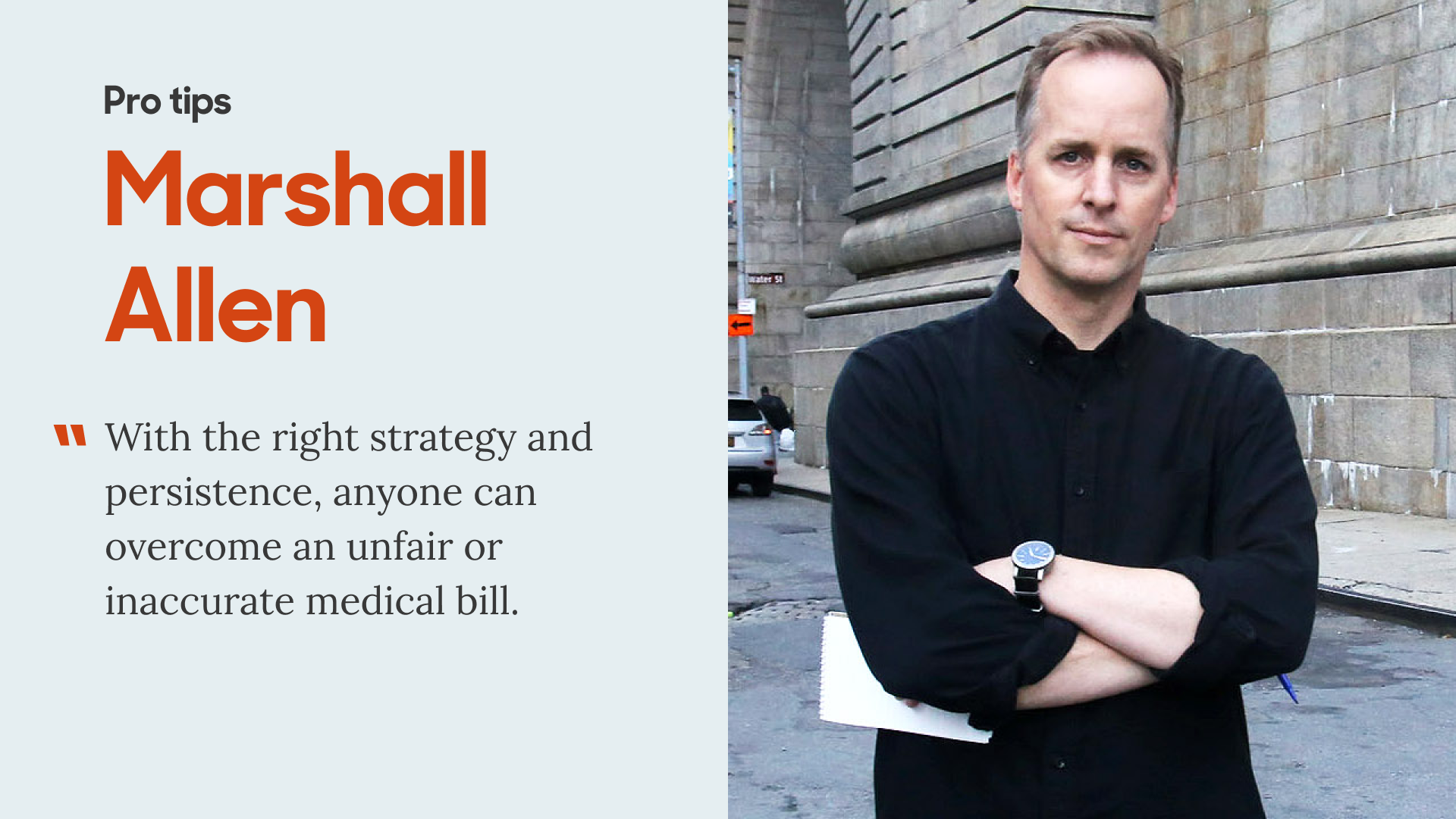As a reporter at ProPublica, Marshall Allen got several calls and emails each week from people who said they were being overbilled by medical providers. Some people who reached out to him were in financial ruin from medical bills.
When Allen dug into their stories, he learned how to analyze medical bills, and how to negotiate them. He knew he could help people navigate their own medical bills, leading to his first book “Never Pay The First Bill: And Other Ways to Fight the Health Care System and Win."
He said: “I decided to write a book that would equip and empower consumers to stand up for themselves, so they could save big money when they interact with the health care system.”
This week we spoke with Allen about protecting yourself from surprise or oversized medical bills, how to tackle one if you get it, and the best financial move he’s ever made.
What are the biggest misconceptions about the U.S. health care system?
The biggest misconception is that we have the best health care system in the world. It is the best if someone is wealthy. But most working Americans are being financially harmed by our health care system. We spend about twice as much per person for our health care in the United States, compared to the citizens of other developed countries, and we get much less for our money. We still have about 30 million uninsured Americans. And we have tens of millions mired in medical debt. We also do not have good health care outcomes compared to citizens of other developed countries.
How can someone contest a major medical bill?
With the right strategy and persistence, anyone can overcome an unfair or inaccurate medical bill. In my book I show you how to get an itemized bill, check it for errors, get the billing codes, and do a price check. If your bill is inaccurate or unfair, you can often sue in small claims court to defend yourself. It might take courage and persistence, and a willingness to learn some health care financial literacy. But it is easier than you think. My book walks you through each step of the process.
How can people protect themselves from high health care costs?
Try asking your doctor this key question: “What happens if we don’t do anything?” Asking what happens if you don’t undergo a discretionary test or treatment may be the most important question to protect us from a host of financial and physical problems that can come with unnecessary treatment. The question crystalizes the conversation. It requires a doctor to lay out the risk of not taking action so we can compare it with the risk and expense of taking action.
You can also avoid high prices if you know where to go, or not go, for things like MRIs and CT scans, prescription drugs, and other procedures. There is so much hidden price variation in our health care system, and that’s one way people end up paying much more than they should.
What’s the biggest mistake you’ve seen other people make when it comes to their own health care?
The biggest mistake we can make is trusting that the system is watching out for us financially, or thinking that someone else is going to take care of this problem of high health care costs for us. The patients are always in the best position to know what type of care they received, and they’re the most motivated to make sure the prices were accurate and fair. We cannot be passive and wait for elected officials or health care stakeholders to take care of us, or fix these problems. This is something employers and working Americans need to do themselves — and they can do it!
How can people begin to tackle medical debt?
I have a whole chapter on this subject in “Never Pay the First Bill.” The short answer is that you need to contest the debt in writing as soon as you hear from a medical debt collector. I have a template you can use in the book. Often, the medical debt collectors won’t even be able to prove that they are the ones who can rightfully collect on the debt. If you know you owe the money, then you need to negotiate for a big discount, as much as 85% according to one expert I spoke to. Make sure you never enter an agreement with a medical debt collector that you cannot afford. If you default, your debt payment will go back to the amount you originally owed.
Why is having affordable health care crucial to someone’s overall financial health?
I like to point out that learning these health care financial literacy skills is like learning other financial literacy skills, like balancing your checkbook. It’s a bit confusing at first because you have to learn something new. But when you have hundreds or thousands of dollars at stake with every health care interaction, it’s definitely worth your while to learn these skills. You wouldn't let someone take that amount of money out of your bank account, so you should also protect your health care dollars!
What’s the best financial move you’ve made?
Always asking for more money, politely, whenever I get a freelance job or a new job offer. If you don’t ask for more money, your employer won’t give it to you. But if you ask nicely, they often will give it to you.
Do you have any financial regrets?
I regret buying a house in Las Vegas right before the Great Recession hit. It wasn’t our fault, but we lost our entire savings on that house!
What’s the best financial advice you’ve ever received?
My parents taught me to live within my means and avoid debt. Thankfully I’ve been able to do that throughout my career.
What’s the worst financial advice you’ve ever received?
I’ve seen people who go into debt for things they do not need, and while they aren’t giving me advice, I don’t think that’s wise.
If you could buy a home anywhere, where would it be & why?
I have always tried to bloom where God has planted me, and that means I’ve lived in Colorado, Kenya, Los Angeles, Las Vegas, and now New Jersey. So it’s hard for me to imagine where else I would live. I’m content where I am now. I would love for someone to give me the money so I could pay off the house I’m in right now!
Image: Nastia Kobzarenko

